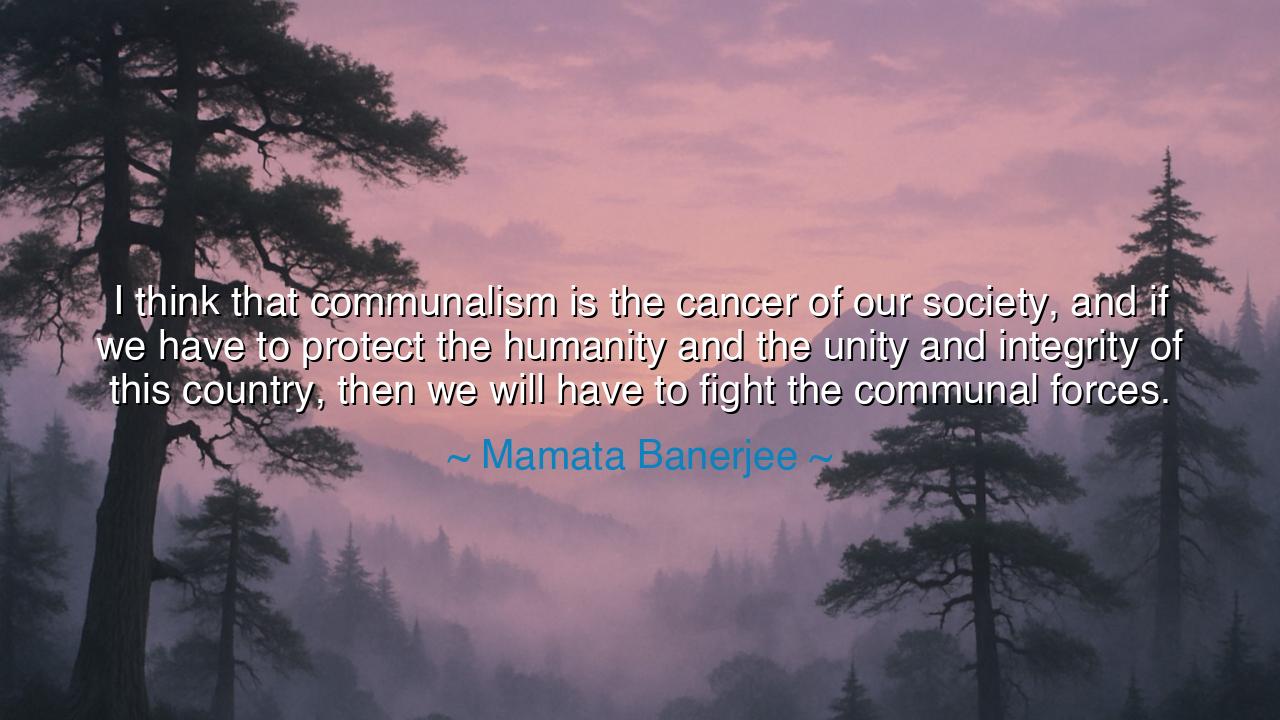
I think that communalism is the cancer of our society, and if we
I think that communalism is the cancer of our society, and if we have to protect the humanity and the unity and integrity of this country, then we will have to fight the communal forces.






Hear the fiery words of Mamata Banerjee, spoken with the urgency of one who has seen the divisions of her land: “I think that communalism is the cancer of our society, and if we have to protect the humanity and the unity and integrity of this country, then we will have to fight the communal forces.” These words are not whispered, but thundered, for they name the enemy not as an invader from without, but as a sickness from within. Communalism—when neighbor turns against neighbor because of creed or community—is like a slow poison that seeps into the blood of a nation, weakening its strength until it collapses from within.
The origin of her warning lies in the history of nations torn apart by sectarian strife. India, whose soil has carried many faiths, many languages, many cultures, has known the harmony of diversity and the agony of division. The Partition of 1947, born of communal conflict, brought rivers of blood, uprooted millions, and scarred generations. Banerjee, inheriting this memory, declares that such forces must not be allowed to grow again. To call communalism a cancer is to name it truthfully: it consumes the body from inside, feeding on division, and if left unchecked, it spreads until the whole is undone.
Consider the story of Bosnia in the 1990s, when ethnic and religious lines were carved into weapons of war. A society that had lived in coexistence for decades fell into slaughter when communal hatreds were inflamed. What had been neighbors became enemies; what had been villages became battlegrounds. The world watched as unity was shattered and humanity betrayed. This history, though far from India, reflects the same danger Banerjee speaks of: that communalism, once ignited, does not remain a quarrel—it becomes destruction.
Her words hold a deeper meaning still: to defend humanity is not merely to prevent war, but to guard the sacred bond that binds people together as one. The unity and integrity of a nation do not lie in shared blood or uniform belief, but in the will to live together despite difference, to protect one another’s dignity even when traditions diverge. Communalism denies this will. It whispers that one group is pure and another tainted, one rightful and another alien. And when that lie is believed, violence follows as shadow follows flame.
Yet her voice is not only warning—it is a call to action. To fight communal forces is not merely the task of governments, but of every citizen. It means speaking against hatred when it is whispered, resisting division when it is preached, refusing to let fear define neighborliness. It means teaching children that the strength of a nation lies not in sameness, but in its chorus of many voices. Like the body that resists disease, so too must a people resist communalism with vigilance and courage.
The lesson for us is this: unity is not a gift that endures without care—it is a living bond, and it must be protected daily. To allow communalism to spread is to invite the dismembering of society. But to confront it boldly is to ensure that the nation’s heart beats strong. Humanity itself is preserved when men and women stand together not as rivals in faith, but as fellow guardians of peace.
What then shall you do? Do not pass silently when hatred is spoken in your presence. Do not allow difference to harden into division. Celebrate the festivals of others as you would your own; share bread across the lines of caste and creed. Support leaders and movements that build bridges, not walls. And when fear urges you to withdraw, remember that to resist communalism is to fight for the integrity of your own soul as well as your country.
So let Mamata Banerjee’s words be remembered: communalism is the cancer of society. And as with every cancer, delay strengthens it, but courage defeats it. Guard unity, guard humanity, and fight not your neighbor but the forces that would turn you against them. For in this struggle lies not only the survival of a nation, but the triumph of the human spirit.






AAdministratorAdministrator
Welcome, honored guests. Please leave a comment, we will respond soon